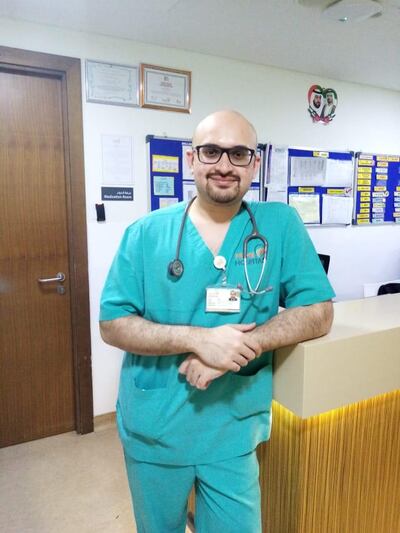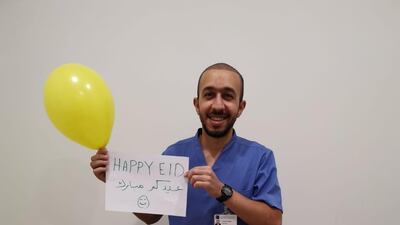Celebrating Eid was not an option for the UAE’s dedicated hospital staff this year as they tended to patients battling Covid-19.
Public and private sector workers enjoyed a five-day holiday to mark the festivities, but doctors and nurses continued to rack up long hours, especially those working in intensive care units (ICU) supporting critically ill patients.
Dr Mohammed Umar Quraishi, a general practitioner resident for internal medicine and ICU at Prime Hospital in Dubai, said that he and fellow staff were on “extra duty” this Eid.
"What happened is that we have to put extra efforts because the numbers are high right now," he told The National.
“We must dissociate from Eid and the celebrations and hope next year is better, not just for us but everyone else as well.”
“Most patients in the ICU have a 50 per cent chance so we can’t afford to have days off. We are stretched thin.”
The UAE had recorded 30,207 coronavirus cases as of Monday evening, with 248 deaths and 15,657 recoveries.

Dr Quraishi said his hospital currently had 11 patients in the ICU and six to seven nursing staff, as well as two to three doctors available.
“The time Covid-19 patients spend on the ventilator can be up to a month,” he said.
“Young patients are spending 20 days on the ventilator because that’s the nature of the illness. These are patients who can develop a stroke and heart attack, so we have to be available.”
Dr Quraishi goes home to his elderly parents who suffer from diabetes. He said he leaves most of what he carried at the hospital behind, showers twice when he reaches home and social distances from his family to keep them away from potential risk.
Mohamed Hegazy is a nurse who works at the King’s College Hospital’s ICU and was spending his first Eid away from his family in Egypt.
His colleagues brought balloons and sweets for the staff celebrating Eid, which they enjoyed inside the ICU during a brief 10-minute break.
“There really was no proper celebration. Our priority is our patients. I’m working 12 hour shifts for four to five days each week and our time is really needed at the hospital,” said Mr Hegazy, who carried out his Eid prayer in the ICU.
When he finishes from his shift, Mr Hegazy must return to a hotel room provided by his employer for isolation.
He said all the staff have been given hotel rooms to keep their families at home away from risk.
“My family is in Egypt, but I live with four roommates here. I’ve been in this hotel for three weeks,” said Mr Hegazy.
Michael Redmond, the head nurse at King’s College Hospital, said the facility has nine out of 11 beds that are occupied in the ICU.
The unit has two doctors and one nurse to each patient.
“It’s hard to consider Eid as a celebration when there are patients who can’t even have family visit them,” Mr Redmond, an Irish citizen, said.
“However, the morale of our staff is quite high at the same time and they work quite well as a team. They keep the spirits high but are extremely aware of the severity of the condition the patients are in.”
In Monday's press briefing, Dr Amna Al-Dahhak, spokesperson for the Ministry of Health and Prevention, encouraged residents to “call and thank” workers in the healthcare sector.
"It is a different Eid for all the families who had to stay home and avoid gatherings. It’s been different for doctors and volunteers, paramedics, nurses, sterilisation teams, all are heroes,” she said.
“If you know someone who works in the healthcare sector, call them and thank them for their efforts".
Sheikh Hamdan bin Mohammed, the Crown Prince of Dubai, met emergency service workers who were on duty on the first day of Eid.
He spoke to police officers and bicycle patrol volunteers at Al Qusais police station.















